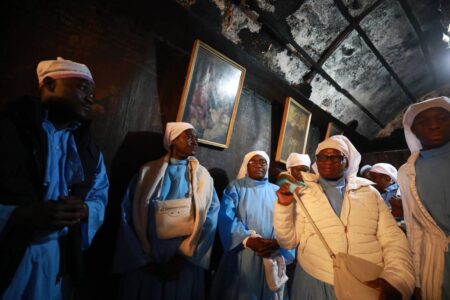
Nigerian Christians fear a bloody holiday season at the hands of Muslim terrorists
Their names haunt me: Patience, Revelation and Rejoice.
Patience was 13. Revelation was 6. Rejoice was 4. They are the names of three of the youngest victims of a Christian massacre unfolding in Africa.
They weren’t the only young victims slain in the same attack in the Nigerian village of Gonan Rogo earlier this year.
The terrorists killed at least 20 that evening as they went from house to house yelling “Allahu Akbar” along the way. They also put a bullet in the head of a 3-month-old and hacked a 6-year-old to death. We don’t know their names. We do know the name of a 14-year-old girl who was murdered along with her grandparents.
Her name was Blessing.
This horror wasn’t even the work of the infamous Boko Haram insurgents who’ve long terrorized Nigeria’s northeast. These massacres came at the hands of a group of radicalized Fulani tribesmen who — profanely inspired by Boko Haram and ISIS — have been summarily executing Christians in the center of Nigeria, not far from the country’s capital, Abuja.
In this democracy, almost no one is ever prosecuted for the crimes. According to Stephen Enada, executive president of the International Committee on Nigeria, there have been at least 63,000 victims.
Thousands of churches have been torched, scores of children slaughtered, countless women enslaved, pastors have been beheaded and Christian homes have been set ablaze by the tens of thousands. The victims are mainly Christian, with the terrorists determined to also kill or extort every single Muslim who attempts to stand in their way. Christmas is a particularly vulnerable time of the year for Africa’s beleaguered Christians.
Last year, the Islamic State in West Africa marked Christmas in Nigeria by beheading 11 Christians on video. Two weeks later they picked up another young Christian as he traveled back home from a Christmas holiday with his family.
The 22-year-old was last seen on a video being executed at point-blank range by a child whose terrorist overlord was issuing a warning to “all Christians in Nigeria’s Plateau State.” Another young victim I met in Nigeria in February had only recently escaped her Christmas kidnappers. She had been picked up by Islamists 5 minutes after passing a government checkpoint. Before they carried her away to the bush they shot the Christian men she was traveling with.
The situation in Africa’s most populated country, with the continent’s largest economy, is getting out of control and it cannot be neglected any longer.
Despite the present US administration’s unprecedented success in advancing religious freedom policies around the world, the current ambassador to Nigeria, Mary Beth Leonard, is one of many senior members of the career foreign service in the US Department of State who seem in total denial about the situation.
During a meeting with myself in February, Amb. Leonard in Abuja actually downplayed the role of religion in the conflict, which she described as “fundamentally a resource issue.” A recent, cursory look at the Embassy’s social media channels in Nigeria didn’t turn up a single acknowledgment of the victims of the conflict. It was business as usual.
The presumptive US Ambassador to the United Nations for a Biden administration is Linda Thomas-Greenfield, who served as a deputy and ally of former Assistant Secretary of State for African Affairs Johnnie Carson back when the Obama-Biden administration refused to even designate Boko Haram as a foreign terrorist organization.
They were, apparently, concerned the designation would foster Islamophobia and give the Nigerian government an excuse to “legitimize a heavy-handed crackdown by [their] security forces at a time when American officials were urging them to avoid human rights abuses,” Carson told The New York Times.
The fact is that the present and pitiful condition in Nigeria represents a multi-year and bipartisan foreign policy failure. All of this in a country which receives approximately $1 billion in aid a year from the United States government, not to mention what it receives from many other countries including 800,000 pounds a day from the United Kingdom, alone.
It’s time for a comprehensive rethink.
We shouldn’t let the poor starve, but we also shouldn’t continue to donate the hard-earned support of the American taxpayer with no real strings attached.
In the meantime, we must ensure the victims no longer suffer in the shadows, even during a pandemic. We must be their voice.
As one pastor recently told the Nigerian press, leaning against his torched Christian school, “This issue of COVID-19: We don’t know anything about it; our problem is Fulani who keep killing us.”
Source: New York Post





